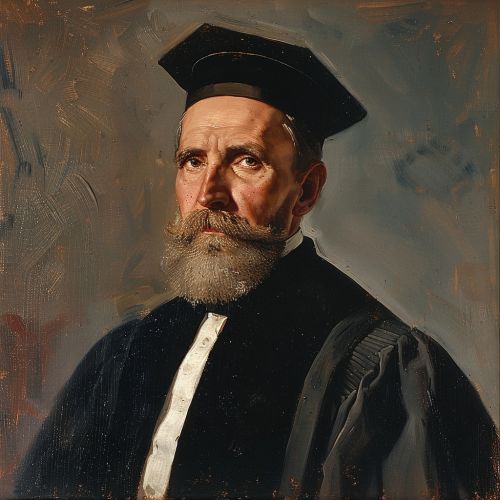Franz Brentano
Early Life and Education
Franz Clemens Honoratus Hermann Brentano was born on January 16, 1838, in Marienberg am Rhein, Germany. He was a member of a prominent family; his father, Christian Brentano, was a writer, and his uncle, Clemens Brentano, was a well-known poet. Brentano's early education was influenced by his family's intellectual environment, which fostered his interest in philosophy and theology.
Brentano pursued his higher education at the universities of Munich, Würzburg, Berlin, and Münster. He studied under several prominent philosophers, including Franz Jakob Clemens and Adolf Trendelenburg. Brentano's doctoral dissertation, "Von der mannigfachen Bedeutung des Seienden nach Aristoteles" ("On the Several Senses of Being in Aristotle"), was completed in 1862 at the University of Tübingen. This work marked the beginning of his lifelong engagement with Aristotelian philosophy.
Academic Career
Early Academic Positions
After completing his doctorate, Brentano began his academic career as a lecturer at the University of Würzburg. In 1866, he was ordained as a Roman Catholic priest, which influenced his early philosophical work. However, his critical stance on certain church doctrines led to his resignation from the priesthood in 1873.
In 1874, Brentano published his seminal work, "Psychologie vom empirischen Standpunkt" ("Psychology from an Empirical Standpoint"), which laid the foundation for his future contributions to philosophy and psychology. That same year, he accepted a position as a professor of philosophy at the University of Vienna, where he taught until 1895.


Contributions to Philosophy
Brentano is best known for his work in phenomenology and psychology. He introduced the concept of "intentionality," which refers to the mind's capacity to direct itself toward objects. This idea became a cornerstone of phenomenological philosophy and influenced later thinkers such as Edmund Husserl, Martin Heidegger, and Jean-Paul Sartre.
Brentano's work in descriptive psychology aimed to classify mental phenomena based on their intentional structures. He distinguished between three types of mental acts: presentations, judgments, and phenomena of love and hate. This classification system provided a framework for understanding the complexities of human consciousness.
Later Life and Legacy
Retirement and Continued Influence
Brentano retired from his position at the University of Vienna in 1895 due to health issues and political controversies. He moved to Florence, Italy, where he continued to write and correspond with other philosophers. Despite his retirement, Brentano's influence on the philosophical community remained strong.
His students, including Alexius Meinong, Christian von Ehrenfels, and Kazimierz Twardowski, carried forward his ideas and expanded upon them. Brentano's emphasis on empirical methods and descriptive analysis laid the groundwork for the development of analytic philosophy and Gestalt psychology.
Major Works
Brentano's major works include:
- "Psychologie vom empirischen Standpunkt" (1874)
- "Untersuchungen zur Sinnespsychologie" (1907)
- "Von der Klassifikation der psychischen Phänomene" (1911)
- "Die Lehre vom richtigen Urteil" (1956, posthumously)
These works collectively contributed to the fields of philosophy, psychology, and the study of consciousness.
Philosophical Contributions
Intentionality
One of Brentano's most significant contributions to philosophy is the concept of intentionality. Intentionality refers to the characteristic of mental states by which they are directed at or about objects. Brentano argued that all mental phenomena are intentional, meaning they inherently possess a reference to something beyond themselves. This idea challenged the prevailing empiricist views of the time and laid the groundwork for the development of phenomenology.
Brentano's analysis of intentionality distinguished between the act of consciousness, the content of consciousness, and the object of consciousness. This tripartite structure provided a nuanced understanding of how the mind engages with the world.
Descriptive Psychology
Brentano's approach to psychology was rooted in descriptive analysis rather than experimental methods. He believed that careful introspection and description of mental phenomena could reveal the fundamental structures of consciousness. This approach contrasted with the emerging experimental psychology of the late 19th century, which focused on measurable behaviors and physiological processes.
In his descriptive psychology, Brentano identified three primary classes of mental acts: presentations, judgments, and phenomena of love and hate. Presentations are the basic mental acts that involve the presentation of an object to the mind. Judgments involve affirming or denying the existence of the presented object. Phenomena of love and hate encompass emotions and attitudes directed toward objects. This classification system provided a comprehensive framework for understanding the diversity of mental experiences.
Influence on Phenomenology
Brentano's ideas significantly influenced the development of phenomenology, particularly through his student Edmund Husserl. Husserl expanded upon Brentano's concept of intentionality and developed a rigorous method for the phenomenological analysis of consciousness. Brentano's emphasis on the descriptive study of mental phenomena also resonated with other phenomenologists, such as Martin Heidegger and Maurice Merleau-Ponty.
Impact on Analytic Philosophy
Brentano's work also had a lasting impact on analytic philosophy. His focus on clarity, precision, and the analysis of mental phenomena influenced early analytic philosophers such as Gottlob Frege and Bertrand Russell. Brentano's insistence on the importance of intentionality and the structure of mental acts contributed to the development of philosophy of mind and philosophical psychology.
